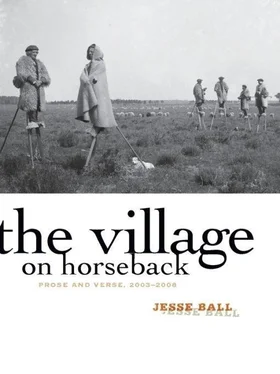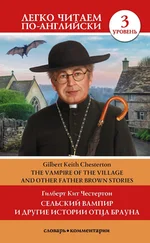Jesse Ball - The Village on Horseback - Prose and Verse, 2003-2008
Здесь есть возможность читать онлайн «Jesse Ball - The Village on Horseback - Prose and Verse, 2003-2008» весь текст электронной книги совершенно бесплатно (целиком полную версию без сокращений). В некоторых случаях можно слушать аудио, скачать через торрент в формате fb2 и присутствует краткое содержание. Год выпуска: 2011, Издательство: Milkweed Editions, Жанр: Современная проза, Поэзия, на английском языке. Описание произведения, (предисловие) а так же отзывы посетителей доступны на портале библиотеки ЛибКат.
- Название:The Village on Horseback: Prose and Verse, 2003-2008
- Автор:
- Издательство:Milkweed Editions
- Жанр:
- Год:2011
- ISBN:нет данных
- Рейтинг книги:5 / 5. Голосов: 1
-
Избранное:Добавить в избранное
- Отзывы:
-
Ваша оценка:
- 100
- 1
- 2
- 3
- 4
- 5
The Village on Horseback: Prose and Verse, 2003-2008: краткое содержание, описание и аннотация
Предлагаем к чтению аннотацию, описание, краткое содержание или предисловие (зависит от того, что написал сам автор книги «The Village on Horseback: Prose and Verse, 2003-2008»). Если вы не нашли необходимую информацию о книге — напишите в комментариях, мы постараемся отыскать её.
Samedi the Deafness
The Way Through Doors,
New Yorker’s
The Village on Horseback
The Village on Horseback: Prose and Verse, 2003-2008 — читать онлайн бесплатно полную книгу (весь текст) целиком
Ниже представлен текст книги, разбитый по страницам. Система сохранения места последней прочитанной страницы, позволяет с удобством читать онлайн бесплатно книгу «The Village on Horseback: Prose and Verse, 2003-2008», без необходимости каждый раз заново искать на чём Вы остановились. Поставьте закладку, и сможете в любой момент перейти на страницу, на которой закончили чтение.
Интервал:
Закладка:
— And west? Have you gone west? asked Elsbeth.
— I have, said Pieter, and he would say no more.
— Stay here awhile, said Pieter, for I must fetch our supper.
But I am not staying, said Elsbeth. I must return to town.
— You can stay for supper, said Pieter. You must.
And Elsbeth nodded in spite of herself.
When he was gone, she looked furiously around herself. Why had she agreed? She would leave a note, saying she had gone, saying she had had to go.
But there was no paper to be found save in books. And Elsbeth would not write in a book.
She walked about the house. There was another room, she noticed, at the house’s back. She tried the door, but it was locked. She pushed against it, but it wouldn’t give.
I wonder, she thought, what could be in this room? For the house as it was was stocked with all that Pieter might need, and his bed was in the one room, his table, his tools. What could be in the spare room?
But the lock would not turn.
She saw that a bird was at the window. She went to the window, and opened it, and the bird did not fly away, but stood quietly, peering at her.
— What is it you want? asked Elsbeth.
She fetched a crumb of cornbread from the table and gave it to the bird. It took the crumb up in its beak and flew away.
What then could that mean? asked Elsbeth, and she sat out on the front steps in the posture she had seen Pieter assume as he waited for her.
An hour passed, and she felt her worry returning. She must get back to the town. This was no place for her. The man was mad. He must be mad. She would not be here when the town sent men for Pieter.
Up she got, and into the house. From her dress she tore a piece, and she wrote on it,

Gone back to town. I will warn you before they come. E.

She owed him that much at least.
And then she was out the door and across the field and on the road where night came to join her.
Back then by foot to wooden Firsk.
|||
— Elsbeth! cried Catha, as she saw her sister at the door.
— Elsbeth, she said again. I have been waiting all night.
Elsbeth came into the room. She was filthy from head to foot from walking the dirt road. She was as weary as she’d ever been.
— I know, said Catha. I know where you went. It’s plain on your face.
— It was a long walk, said Elsbeth.
— I will put water on for a bath. Change out of your clothes, and I’ll set out some supper. Poor thing.
And so Catha filled a bath, and made a supper, and when Elsbeth emerged and sat down at table, she ate a little.
— Speak, said Catha, for I’ll wait no more.
— I went to his house. He was there, alone, living alone. He has done. . terrible things. He admitted as much, though he can’t see it. He can’t see what’s wrong with the things he’s done.
The sisters looked at each other as though from far away.
— Do you understand? asked Elsbeth.
— More and worse happened today, said Catha. There was another meeting. Loren, Malin’s son, was out in a field. Malin said the field grew up around him and the boy was gone. Just like that, the boy gone. All the farmhands came, the field was searched clear from one end to the other, but the boy was gone.
— Cran’s boy Levin Mills saw himself in a mirror, turned old, and when his sister found him, she couldn’t comfort him. He’s convinced his body’s withering, and he can hardly draw a breath for fear.
— Dar Stane fell from a ladder, and his wife watching him. Fell to the street and landed on his head.
— Someone set fire to the Oulen’s place. It near burned to the ground, and the barn as well, but the fire didn’t touch the animals. They didn’t even notice it.
— Ann Severn can’t find her husband Tham. He went to gather wood, and hasn’t been seen. There’re a dozen stories, and a dozen more. People are angry. They’re setting out in the morning to take him. Galvin Falk and twenty others. My Jaim spoke against it, but he was shouted down, and there wasn’t much to say anyway, what with all that’s been happening.
— Falk was angry, angry as I’ve ever seen him. He said we could not stand to live with a murderer not fifteen miles away. He said that even if we did not judge ourselves, that our fathers and their fathers, and our children and their children, all these would judge us. There was a great argument, but when the sticks were passed around, most were for it.
— Four people dreamed it the first night, and seven the next. Everyone in town has dreamed the same dream, said Catha.
— What was it? Did you?
— No, said Catha. They dreamed of a wasteland, stretching into distance on all sides. At the center, a thin wooden ladder ascending out of sight through the clouds.
— But there’s this, said Catha. Of all in the town, only one was brave enough to climb the ladder, even in a dream.
— Who? asked Elsbeth.
— Dunough Lark. She climbed it hand over hand, and when she passed through the first cloud, she said there was a world in red, that frightened her. When she passed through the second, there was a world in blue that gave her a sadness she will never dispel. Yet when she passed through the third, she found herself in her own room, made lovelier and stranger than she ever had been.
— And was it true?
— None would have recognized her, but for her voice, which was the same, but quieted.
When Elsbeth woke it was well past noon.
— Have they left? she cried, and she knew that they had, that the mayor’s party had passed out along the road at first light.
Down the stairs she went. Jaim was there. He called out to her, but she ran on. On she went to the stable, where she hired a horse.
— Where is it you’re going, Mistress Grimmer? asked the stablehand.
But Elsbeth rode past him without a word.
Out onto the road and urging the horse on. She was a quarter of the way there, then more, when she heard a pounding of hooves ahead on the road. She drew off, dismounted, and led her horse into the woods.
In the world, there is a time when one feels a confederacy with others. That time may last a short while. It may last through all of one’s life. Elsbeth had felt that twice in this world, once with her sister, in a lasting bond, and once with Pieter. So unlike the others was she that she felt sometimes incapable even of speaking when out in public. The matter of greeting those who greet in the road was a huge complication, and she would go backways through the streets to avoid it. As a child, she had pretended there were two of her, Elsbeth, her parent’s daughter, and Elsbeth-made-of-shadows. Elsbeth-made-of-shadows could do what she liked, and did. It was she who befriended Pieter. The things they did were not good things, not always. Once, they cut off a horse’s hoof for no reason at all, and left it on the steps of the church.
Pieter was caught for that, but he did not say who had been with him, and Elsbeth had gone unpunished.
They had whipped and whipped him for that. Meyer the cart-driver, whose horse it was, was given way, and he had taken it.
The boy’d been held down by his father while Meyer laid into him. Elsbeth had watched, along with others.
How could they decide, she’d wondered, a penalty for the cutting off of a horse’s hoof? Who is smart enough in this world to know what that crime equals, to know what punishment absolves it? Something so absurd can have no correspondent.
Читать дальшеИнтервал:
Закладка:
Похожие книги на «The Village on Horseback: Prose and Verse, 2003-2008»
Представляем Вашему вниманию похожие книги на «The Village on Horseback: Prose and Verse, 2003-2008» списком для выбора. Мы отобрали схожую по названию и смыслу литературу в надежде предоставить читателям больше вариантов отыскать новые, интересные, ещё непрочитанные произведения.
Обсуждение, отзывы о книге «The Village on Horseback: Prose and Verse, 2003-2008» и просто собственные мнения читателей. Оставьте ваши комментарии, напишите, что Вы думаете о произведении, его смысле или главных героях. Укажите что конкретно понравилось, а что нет, и почему Вы так считаете.












